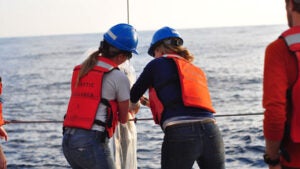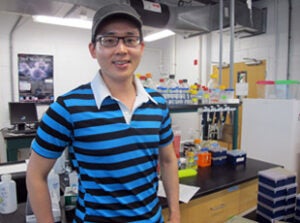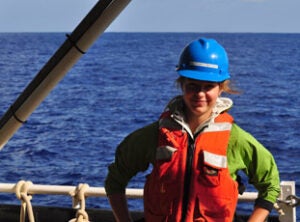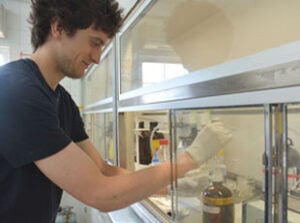Canadian Students Excel at BIOS

Since its inception in the 1970s, the Canadian Associates of BIOS (CABIOS) program has provided over a hundred Canadian students and young scientists with financial assistance to pursue oceanographic research or academic coursework at BIOS. Founded by the late Dr. Earlston Doe, a former BIOS Life Trustee and Canadian oceanographer born in Bermuda, the CABIOS fund honors the memory of his youngest son Learmont “Leary” Doe.
In the decades following its formation, CABIOS received annual support from a variety of individuals, businesses, and organizations, including several generous donations that allowed the fund to grow and diversify. Today, through strong partnerships with a variety of Canadian universities—including Dalhousie University, Trent University, McGill University, and the University of Toronto—CABIOS supports multiple Canadian students each year for BIOS summer courses and internships.
In the past few months, BIOS has welcomed three CABIOS students as interns in various labs:
 Colin Du graduated from Trent University with an M.S. in molecular biology. He first came to BIOS in the summer of 2012 as an intern with Dr. Andrea Bodnar in the Molecular Discovery Lab, then was invited by Dr. Bodnar to return for another 6-month internship. During this time, Colin investigated the stem cell theory of aging and the free radical theory of aging in three species of sea urchin. His work generated novel insights into the mechanisms that control aging and he was first author on a paper that was recently accepted for publication in Free Radical Biology and Medicine.
Colin Du graduated from Trent University with an M.S. in molecular biology. He first came to BIOS in the summer of 2012 as an intern with Dr. Andrea Bodnar in the Molecular Discovery Lab, then was invited by Dr. Bodnar to return for another 6-month internship. During this time, Colin investigated the stem cell theory of aging and the free radical theory of aging in three species of sea urchin. His work generated novel insights into the mechanisms that control aging and he was first author on a paper that was recently accepted for publication in Free Radical Biology and Medicine.
“I enjoyed every minute of my research experience at BIOS. I grew so much both academically and personally under Dr. Bodnar’s guidance. Her research ideas in the fields of Aging and Stem cells captivated me. Her great vision and passion for Science inspired me to work hard.”
 Vero Oldham graduated in 2012 from the University of Toronto with an honors bachelor degree with a specialist in environmental chemistry. She started working at BIOS in the summer of 2011 with Dr. Kristen Buck in the Trace Metal Biogeochemistry Lab, assisting with preparations for a GEOTRACES cruise. She returned to BIOS in September 2012 on a 3-month CABIOS fellowship to analyze samples from Castle Harbour for copper speciation and toxicity. Vero received additional funding from the Roger T. Stone Fellowship and the C&H Montgomery Moore Fellowship to extend her work at BIOS until June 2013. She is currently working on a publication for submission entitled “Spatial variability of total dissolved copper and copper speciation from the inshore waters of Bermuda.” This July she will be starting a Ph.D. program at the University of Delaware College of Earth, Ocean, and the Environment focusing on the metal chemistry of seawater.
Vero Oldham graduated in 2012 from the University of Toronto with an honors bachelor degree with a specialist in environmental chemistry. She started working at BIOS in the summer of 2011 with Dr. Kristen Buck in the Trace Metal Biogeochemistry Lab, assisting with preparations for a GEOTRACES cruise. She returned to BIOS in September 2012 on a 3-month CABIOS fellowship to analyze samples from Castle Harbour for copper speciation and toxicity. Vero received additional funding from the Roger T. Stone Fellowship and the C&H Montgomery Moore Fellowship to extend her work at BIOS until June 2013. She is currently working on a publication for submission entitled “Spatial variability of total dissolved copper and copper speciation from the inshore waters of Bermuda.” This July she will be starting a Ph.D. program at the University of Delaware College of Earth, Ocean, and the Environment focusing on the metal chemistry of seawater.
“Working with Dr. Kristen Buck has changed my life, and opened more doors than I could have imagined; I am so grateful for my experience here with her. BIOS is a place where exceptional and unique science can take place, and I hope to be able to come back, again and again.”
 Paul Dainard is currently doing his Masters at Trent University in the Environmental and Life Sciences program. Over the course of his two-month internship at BIOS Paul will be working with Natasha McDonald on the Bermuda Bio-Optics Project (BBOP) studying the optical characteristics of chromophoric dissolved organic matter (CDOM) in seawater. Paul’s work at BIOS, which will be used for his thesis work, builds on a significant body of research on CDOM in the Gulf of Alaska and the Bering, Chukchi, and Beaufort Seas.
Paul Dainard is currently doing his Masters at Trent University in the Environmental and Life Sciences program. Over the course of his two-month internship at BIOS Paul will be working with Natasha McDonald on the Bermuda Bio-Optics Project (BBOP) studying the optical characteristics of chromophoric dissolved organic matter (CDOM) in seawater. Paul’s work at BIOS, which will be used for his thesis work, builds on a significant body of research on CDOM in the Gulf of Alaska and the Bering, Chukchi, and Beaufort Seas.
“In addition to acquiring new skills in the lab I am getting an opportunity to develop more efficient and strategic approaches to processing and analyzing extensive datasets. I will also have the unique opportunity to compare the photochemistry of CDOM in deep waters of the North Atlantic Subtropical Gyre to the Beaufort Sea.”
CABIOS students that participate in internships at BIOS are often able to use the experience as a springboard for future academic opportunities, to author or co-author papers for peer-reviewed scientific journals, or as a source of high-caliber data for graduate thesis work. BIOS looks forward to building upon its current relationships with Canada’s top universities, as well as cultivating the CABIOS program and donors, in order to continue providing opportunities for Canadian students to pursue in-depth oceanographic studies and career-advancing internships at BIOS.
For more information on the CABIOS program, including how Canadian citizens can make tax-deductible donations, please contact BIOS Development Officer Pamela Amaral.
